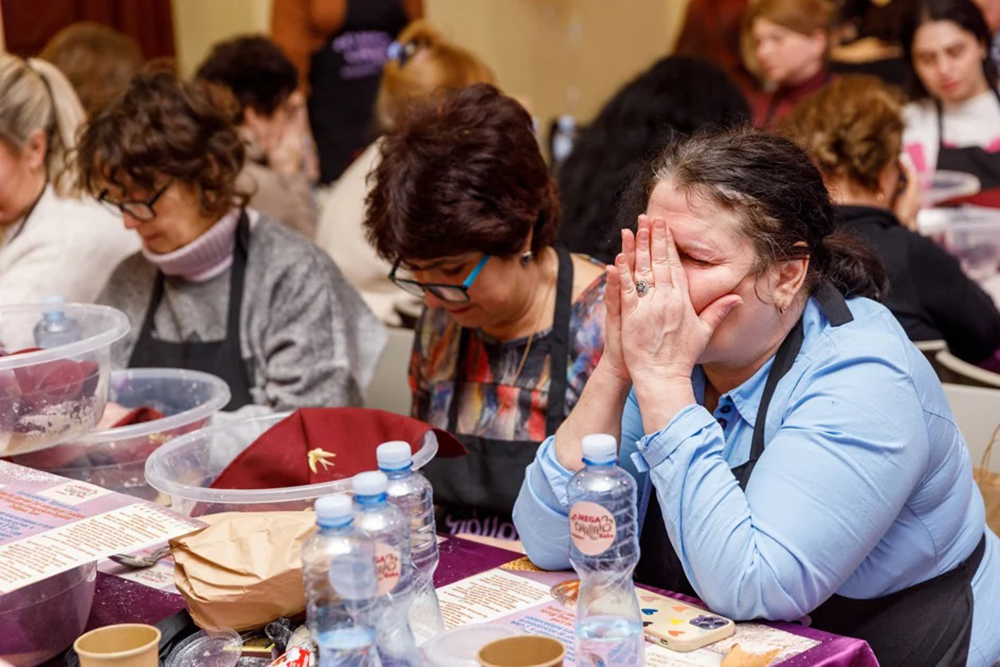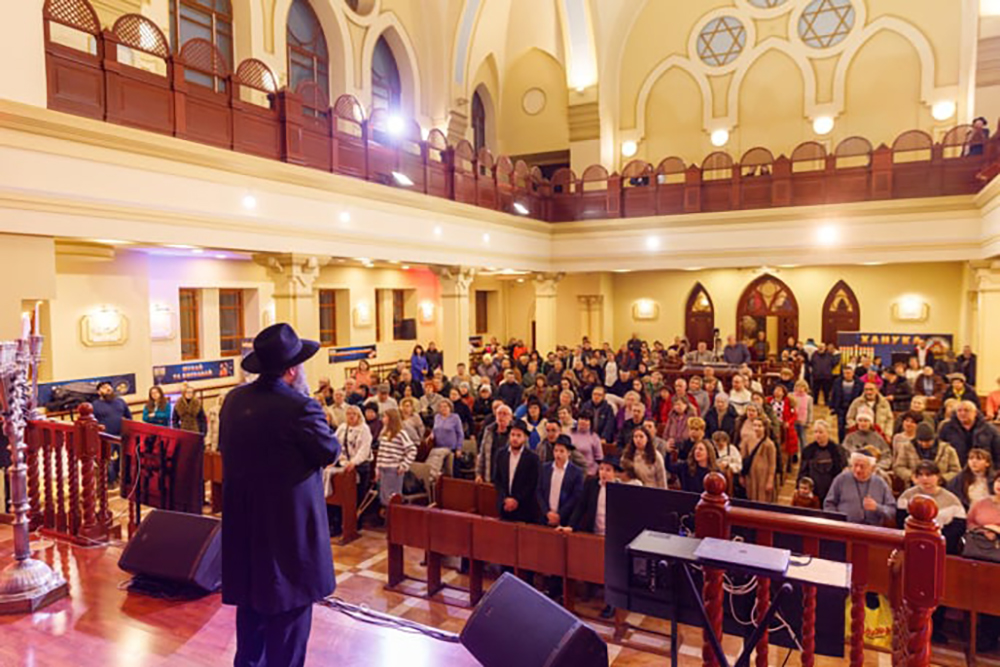|
Getting your Trinity Audio player ready...
|
Blending the new normal of war with the surreal in Israel
By: Uziel Scheiner
On the evening of Oct. 6, 2023, as the globe blissfully rotated, an 8,000-lb. Iskander missile tore through the Kharkiv skyline and slammed into the city center, devastating everything within its range. The explosion shattered the windows in nearly every building within a three block radius, including those of Chabad-Lubavitch of Kharkiv’s soaring Choral Synagogue.
The following day, Oct. 7, 2023, Palestinian terrorists from Gaza stormed into Israel, unleashing a multi-hour killing, raping, torturing and kidnapping spree which they filmed and proudly broadcast to the world in all its vivid, horrific detail.
People of good conscience were shocked by the event, none more so than the global Jewish community. After the Palestinians launched the war, Israel immediately mobilized, and weeks later entered Gaza. War had come to the Holy Land.
For the Jews of Ukraine, the war in Israel was at once startling and frightening, but also wearily familiar.

A little more than a year and a half earlier, Russia invaded Ukraine, trapping the Jewish community of Ukraine in Europe’s most significant armed conflict since World War II. Since February 2022, Ukraine’s Jews—like their countrymen—have found themselves under frequent aerial bombardment and vacillating military campaigns that have killed and injured civilians, damaged and even destroyed whole cities, and suspended their lives in flux.
On the second anniversary of the war in Ukraine, the country remains embroiled in a struggle that shows no signs of abatement. The story of the war in Ukraine is one of bloodshed and contested borders; the alarming ramifications of a territorial struggle for the rest of the world; the cost of needless violence in a world which thought it ascended from gruesome, trudging warfare of the 20th century.
The story of the 250,000 Jews of Ukraine is one of fear, upheaval and uncertainty of if their lives and community can ever again look like it did prior to Feb. 24, 2022. But their story is also one of hope and bravery; selfless leadership in the face of overwhelming crisis; an unbreakable bond with fellow Jews experiencing a parallel war in Israel; and a reinvigorated connection to Judaism, which only intensified when confronted with war’s endless suffering.
The Sderot of Ukraine
Rabbi Moshe and Miriam Moskovitz moved to the city of Kharkiv, Soviet Ukraine, as Chabad-Lubavitch emissaries in the summer of 1990. At the time, the city was part of a rapidly disintegrating Soviet Union. Among the many changes sweeping across the Soviet Union was the return of synagogues confiscated by the Communist government decades earlier, and Kharkiv’s domed Choral Synagogue, which had been closed for religious worship for 67 years, was finally returned to the Jewish community. The synagogue their base, the Moskovitzs set about revitalizing Jewish life and practice in a place where it had been banned for over seven decades.
A year later, the Soviet Union fell and Ukraine became an independent country. For the next 32 years, the Moskovitzs diligently served as spiritual leaders in Kharkiv, attending to the needs of the Jewish community as well as the wider public in what was always a difficult part of the globe. And then the war broke out.
“Everyone watching the news saw this war coming,” says Miriam Moskovitz. “But we were not worried. No one here thought a war was actually coming. It just seemed far-fetched.” Just one day before the war, Chabad of Kharkiv held a large celebration in honor of the 30th anniversary of its Ohr Avner Jewish day school.
The next day, Feb. 24, 2022, the bombs began to fall. “The first feeling was one of shock,” Moskovitz recalls. “You have sirens blaring with missiles falling all around and then we have tanks rolling through our city.” A deep fear struck the whole Kharkiv community, which hunkered in basements and prayed the bombs falling from the sky wouldn’t strike their homes.
“The early day of the war was terrifying. Kharkiv is like the Sderot of Ukraine,” she says, referring to the southern Israeli city that has suffered from more than 10,000 Kassam rockets fired from nearby Gaza since 2001 and was likewise attacked on Oct. 7. “We’re only 40 kilometers [25 miles] from the Russian border. We have 15 seconds to reach shelter from when the sirens go off—if they go off at all.”
But for the Moskovitzs, the early grip of personal fear gave way to a new feeling—the sense of responsibility for their community.
“Our mindset shifted to the community,” Moskovitz said. “When I think back to the early days of the war I don’t remember fear, just the constant question of ‘what can we do’ to help those who were relying on us.”
Kharkiv’s Jewish community needed everything, and Chabad was there to provide food, medicine, shelter and arrange routes for evacuation. In the first months of the war, evacuees from more dangerous parts of Ukraine who were ordered to leave their homes for their safety began pouring into Kharkiv and arriving at Chabad’s doorstep. When Ukrainian soldiers showed up at their doors with evacuation orders and asked the Jewish residents where they would like to go, they responded with one word: synagogue.
Hundreds of people showed up to the synagogue and slept in its basement for months. To deal with the growing influx of evacuees, the Moskowitzs began arranging housing for the incoming Jews in nearby apartment complexes, all while keeping a steady supply of food, supplies and medicine coming to Chabad for distribution.
Tending to the community requires innovating new methods to make sure the Kharkiv’s Jews were safe. Since the war began, Chabad has mapped a database of Jews in the city and when a bomb falls, they check the location of impact and see which community members lived in the area, quickly making contact with them to make sure they’re OK. This rapid response mechanism allows Chabad to supply a family whose power and gas were wiped out with portable heaters and repair the homes of families whose windows were wiped out by incoming missiles.
The past two years have allowed Chabad in Kharkiv and around the country to innovate in ways they never dreamed or desired.
War and Peace
As the war dragged on, the world’s attention, and interest, began to wane. Rabbi Nachum Ehrentreu, who together with his wife, Dina, co-directs Chabad of Zaporizhzhia, Ukraine, describes how difficult it was for the residents of Ukraine to watch the world move on while missiles still rained on their homes. “In the beginning, everyone was sending messages of support and praying for us; now, it’s more out of mind. It’s very hard for the people here.”
As time passed, however, the attitude in Ukraine changed for the residents as well. Two years in war forces one to continue daily life as much as possible, even with missiles flying overhead. Chabad in Zaporizhzhia and Kharkiv, but also Kyiv, Odessa and Zhytomir are now tasked with running a dual operation: putting together the normal functions of Jewish communal life, like bar and bat mitzvahs, brit milahs and Mega-Challah bakes, all while attending to the needs of a community in a war.
Chabad centers throughout Ukraine have gone back to providing the basic services of a Jewish institution, albeit with some changes. Kharkiv’ Jewish day school is back up and running—just now it’s held in the synagogue’s basement. The rabbi and rebbetzin are still visiting community members—now they make sure they have heat and water in addition to Shabbat candles. The Passover seder is still going forward, but now it’s being done in an “express” fashion so that everyone can be home by curfew.
One surprising development amid the stress and fatigue of a plodding war has been a newfound desire to connect with Judaism on the part of countless Ukrainian Jews. Both the Moskovitzs in Kharkiv and the Ehrentreus in Zaporizhzhia marvel at the number of Jews who have “come out of the woodwork,” spurred by crisis all around them to connect to their heritage. The Moskowitzs have a full list of adults and children who have scheduled to have their brit milahs. The Ehrentreus have put up hundreds of mezuzahs on the doorposts of homes throughout Zaporizhzhia, as people turn to G‑d’s protection from the bombs that land around them. When people line up for food packages outside Chabad of Kharkiv, a second line forms with men who wish to put on tefillin.
Rabbi Ehrentreu speaks of the 800 Jewish families that he’s met since the war started.
“People are craving to come closer to G‑d now,” says Ehrentreu. “We are meeting so many people who previously identified as atheists, who now stream to the synagogue in search of coming closer to G‑d.”





